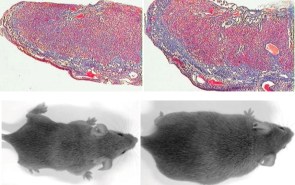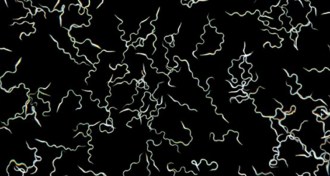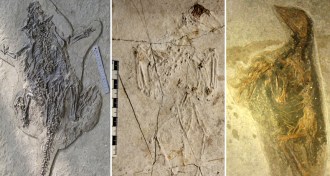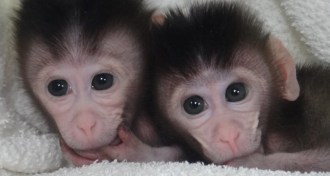Life
Sign up for our newsletter
We summarize the week's scientific breakthroughs every Thursday.
-
 Neuroscience
NeuroscienceProsthetic provides sense of touch to man who lost hand
A new prosthetic hand restores a sense of touch by stimulating nerves in the arm.
-
 Ecosystems
EcosystemsAmazon doesn’t actually go green in dry seasons
An optical illusion in satellite data made forests appear to grow faster.
By Meghan Rosen -
 Life
LifeThe fluid part of semen plays a seminal role
We often think of reproduction as involving only sperm and egg. But a new study highlights the seminal role of liquid semen in fertility and healthy offspring.
-
 Genetics
GeneticsChemical changes to genes make twins’ pain differ
Chemical changes to genes may make identical twins experience pain differently.
-
 Health & Medicine
Health & MedicineOvercoming peanut allergy requires maintenance for most
In small study, nearly all people who stopped eating the legumes daily later experienced an allergic reaction.
By Nathan Seppa -
 Life
LifeMosquito sperm may sense smells
Mosquitoes’ sperm may have chemical sensors that detect odors similar to the way the insect’s antennae sort smells.
-
 Paleontology
PaleontologyRivers of rock and gas froze ancient animals in time
Ancient Chinese fossil beds were preserved by high-speed rivers of volcanic rock and gas.
-
 Humans
HumansDNA suggests humans moved back into Africa
About 3,000 years ago, human populations from western Eurasia migrated back into eastern Africa, specifically Ethiopia.
-
 Genetics
GeneticsBacteria can be genetically tricked into self-destructing
Manipulating microbes’ defenses could lead to targeted antibiotics.
-
 Animals
AnimalsCane toads can handle the cool
The invasive amphibians may be able to spread farther across Australia than previously thought.
-
 Animals
AnimalsFungi threaten sea turtle nests
The pathogens can kill up to 90 percent of eggs in a single nest.
-
 Genetics
GeneticsMonkeys born with edited genes
A DNA-snipping technique inspired by bacteria shows therapeutic promise.